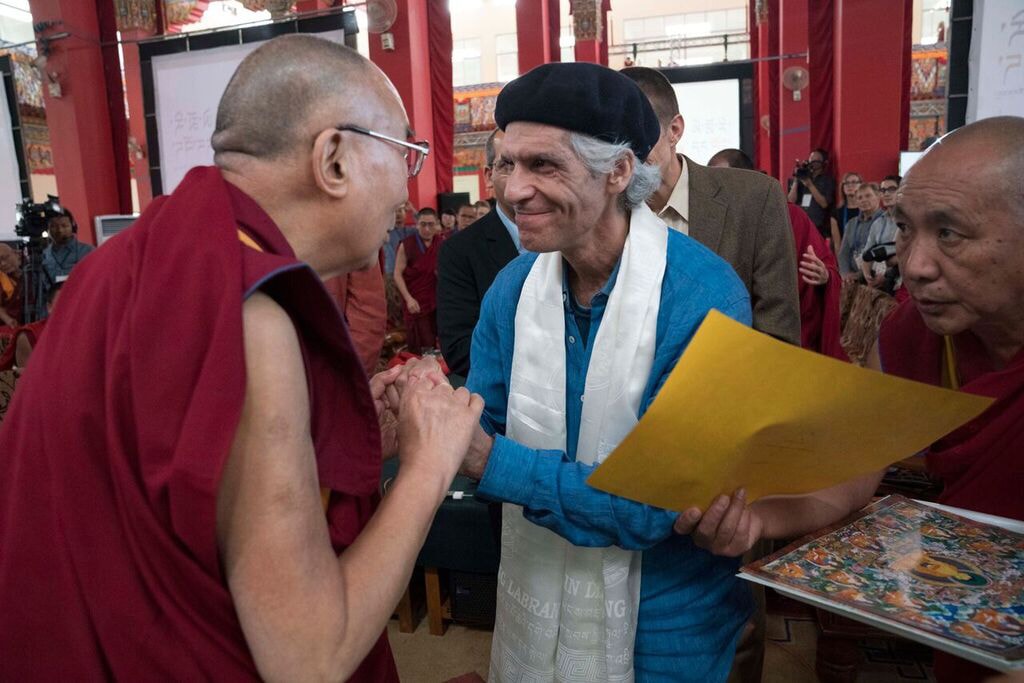History
The Nalanda Institute for Contemplative Science grew out of founder Joe Loizzo’s research in contemplative science at Columbia University and Weill Cornell Medical College from 1996 to its founding in 2007. It was inspired by the ancient University of Nalanda, the world’s first university, which flourished in North India from the fifth to the thirteenth centuries, and influenced all of Asia. It offers a paradigm of a human-centered culture of learning that puts contemplative science and practice at the heart of learning in the physical and social sciences, humanities and the arts, with the aim of fostering a way of life that is fully embodied, compassionate, equitable and sustainable. Preserved in the colleges and medical schools of Tibet, now transplanted back into India, the Nalanda curriculum stands as a time-capsule of one of the world’s most highly developed systems of contemplative science and practice, compassionate ethics, integrative healthcare and positive psychology.
We acknowledge the many generations of teachers who have preserved and refined this transformational human legacy so that today we can integrate it with the most promising breakthroughs in neuroscience, psychology, and social ethics into programs that help us all transform our contemporary way of being and living.
We welcome all people to come learn and change with us.

Founder
Joseph (Joe) Loizzo, MD, PhD, is a Harvard-trained psychiatrist and Columbia-trained Buddhist scholar with fifty years’ experience studying the beneficial effects of contemplative practices on healing, learning and development. He is Assistant Professor of Clinical Psychiatry in Integrative Medicine at Weill Cornell Medical College, where he researches and teaches contemplative self-healing and optimal health. He has taught the philosophy of science and religion, the scientific study of contemplative states, and the Indo-Tibetan mind and health sciences at Columbia University, where he is Adjunct Assistant Professor at the Columbia Center for Buddhist Studies.
In 1998, Dr. Loizzo opened the Center for Meditation and Healing at Columbia University’s Presbyterian Hospital, the first mind/body medical center in a major academic department of psychiatry, and the first in the West to offer programs in stress-reduction, self-healing, and lifestyle change integrating compassion practice, role-modeling imagery, and advanced breath-control skills with basic mindfulness and yoga.
The Center for Meditation and Healing joined the Center for Integrative Medicine at Weill Cornell Medical College in 2003, to better test and refine the effectiveness of its programs. Dr. Loizzo founded Nalanda Institute for Contemplative Science two years later, to make these programs more available to professionals and the public at large. In 2007, the Institute was incorporated in New York State as a not-for-profit educational foundation. Since then, its programs and community have been steadily evolving to meet the growing demand for neuroscientifically informed and psychosocially transformative training in contemplative practices and their integration into contemporary healthcare, business, education, and daily life. Beyond the Compassion-Based Resilience Training (CBRT) offered since 1998 at New York Presbyterian Hospital, the Institute has three other main programs: the intensive five- to eight-month CBRT Teacher Training; the unprecedented three-year Contemplative Psychotherapy Program; and the groundbreaking six-month Boundless Leadership Program.
Raised in Switzerland and educated in a Marianist Catholic boy’s school in New York, Dr. Loizzo graduated summa cum laude in Independent Study from Amherst College. He completed his medical studies at New York University and his postgraduate training in psychiatry at Harvard Medical School. His Ph.D. from Columbia University is in Indo-Tibetan Studies. He also holds an M.F.A. from the Warren Wilson Program for Writers.
His academic honors include phi beta kappa; the Father Chaminade Awards for English and Religion; the first Mosely Prize in Philosophy and Religion; the Herman Wortis Prize in Neuropsychiatry and Medicine; a Mellon Faculty Fellowship in Indo-Tibetan Studies; and a Columbia University President’s Fellowship in the Scientific Study of Religion.
Beyond his teaching at Harvard, UC Davis, Columbia, and Cornell, Dr. Loizzo has lectured internationally on the health benefits of contemplative practices to a wide range of professional and public audiences. He teaches year-round at Nalanda Institute and gives frequent talks at Tibet House US and a wide range of conferences and summits on his work weaving humanity’s timeless contemplative sciences and healing arts into modern medicine, psychotherapy, leadership, and education.
Dr. Loizzo’s research has taken him from Harvard’s Mind/Body Medical Institute and Cambridge Hospital westward to the Psychiatry Training Program at UC Davis, and eastward to Drepung Monastic University in India. Now at the Weill Cornell Center for Integrative Medicine, he has completed four pilot studies on the impact of CBRT on the lives of women recovering from breast cancer. The positive findings of these studies–marked reductions in stress, traumatic avoidance, and intrusive thinking combined with clear gains in social-emotional functioning and quality of life—have been published in peer-reviewed journals including Alternative Therapies in Health and Medicine, the Annals of the New York Academy of Sciences, Biomed Central and the Journal of evidence-Based Complementary and Alternative Medicine Currently he is conducting ongoing studies of CBRT at the Weill Cornell Breast Center, and consulting on research at the City University of New York applying CBRT to burnout prevention in frontline health workers, and a preliminary study at Rockefeller University applying CBRT to reduce racism-based stress.
Beyond his clinical research, Dr. Loizzo has published dozens of scientific articles and scholarly chapters on contemplative approaches to psychotherapy, leadership, and education, the role of contemplative self-healing in healthcare, and the Nalanda tradition of mind and health science. This includes seven review articles on contemplative neuropsychiatry and psychotherapy published in the Annals of the New York Academy of Sciences, the American Psychiatric Association Press, and Oxford University Press. His 2007 translation study, Nagarjuna’s Reason Sixty with Candrakirti’s Commentary, was one of the inaugural volumes in the American Institute of Buddhist Studies Translation Series distributed by the Columbia University Press and has since been reissued by Wisdom Publications.
Dr. Loizzo’s comprehensive textbook, Sustainable Happiness: The Mind Science Of Well-Being, Altruism, and Inspiration was published by Routledge in 2012. He is executive editor of Advances in Contemplative Psychotherapy: Accelerating Healing and Transformation, a groundbreaking collection of essays by diverse, leading voices in a promising new field, now in its second edition (Routledge, 2017 & 2023). Most recently, he published with Elazar Aslan Boundless Leadership: The Breakthrough Method to Realize Your Vision, Empower Others and Ignite Positive Change (Shambhala, 2022), the 2022 Gold winner of the prestigious Nautilus Award in Business & Leadership, named Top Five Compassionate Leadership Books of 2021 and selected by Next Big Idea Club’s 2022 list of books we can’t wait to read this winter. He is currently working on a new book, Waking Up Human: How Embodied Therapies, Disruptive Science, Radical Wisdom Traditions, and the Study of Mystical/Psychedelic Experience Are Converging to Spark an Inclusive, Global Awakening of the Human Spirit.
Dr. Loizzo lives in Manhattan with his wife Gerardine and sons, Maitreya Dante and Ananda Rowan, where he maintains a private practice of contemplative psychotherapy.

